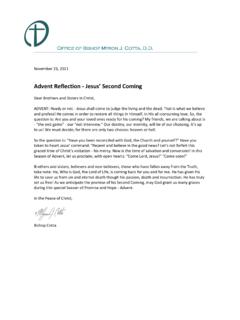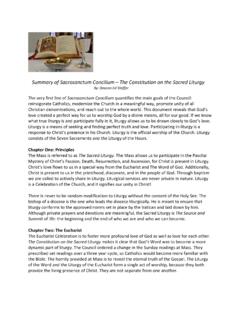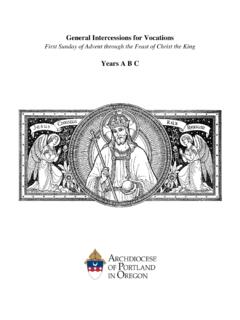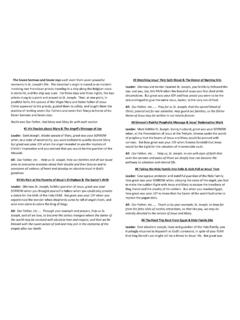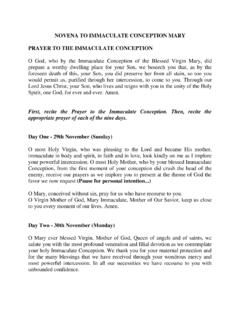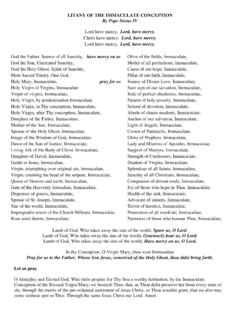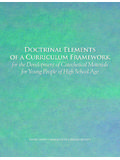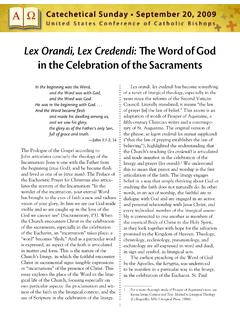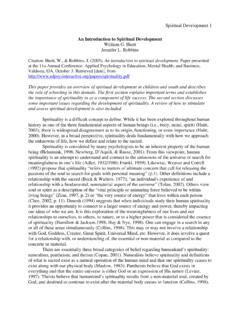Transcription of The Ten Commandments: Roman Catholic list and explanation
1 The Ten Commandments: Roman Catholic list and explanation The traditional numbering and order of the Ten Commandments is as stated in the Catechism of the Catholic Church [n. 2051] with references to Scripture added. 1. I am the LORD your God: you shall not have strange gods before me. (Exodus 20:2-6; Deuteronomy 5:6-10) 2. You shall not take the name of the LORD your God in vain. (Exodus 20:7; Deut 5:11) 3. Remember to keep holy the LORD S Day. (Exodus 20:8-11; Deut 5:12-15) 4. Honor your father and your mother. (Exodus 20:12; Deut 5:16) 5. You shall not kill. (Exodus 20:13; Deut 5:17) 6. You shall not commit adultery. (Exodus 20:14; Deut 5:18) 7. You shall not steal. (Exodus 20:15; Deut 5:19) 8. You shall not bear false witness against your neighbor. (Exodus 20:16; Deut 5:20) 9. You shall not covet your neighbor s wife. (Exodus 20:17; Deut 5:21) 10.
2 You shall not covet your neighbor s goods. (Exodus 20:17; Deut 5:21) All the commandments are closely related to one another. The first three are based on the love of God above all else. The next seven are based on the love of neighbor as self. And whosoever loves his neighbor also loves God, at least implicitly. 1. The first commandment is the greatest, and from it all other commandments flow. The human person must acknowledge that God exists and is holy. You shall not worship false gods, because you must worship the one true God. And the worship of false goods includes not only the literal worship of pagan gods, but also adherence to grave errors on religion, and the exaltation of temporal things as if they were gods (money, power, sex, fame, etc.). 2. The second commandment follows from the first. There is one true God, who must be worshiped; therefore, you shall not take His name in vain by: direct blasphemy, indirect blasphemy, swearing falsely in his name, teaching grave errors on religion, leading others away from the path of salvation, or by refusing to repent from grave sin.
3 For final impenitence is blasphemy against the Holy Spirit. 3. The third commandment follows from the first two. Worship God and respect true religion by keeping holy the Sabbath and the holy days, and by respecting all holy things (the Church, ordained persons, sacred places, sacred objects). 4. The fourth commandment is based on the previous three. The family is a figure for the relationship between God and humanity, since we are all His children. Honoring your parents also honors God. Just as parents give life to their children and educate them, so also does God give life, temporal and spiritual life, to His children, and He educates them in faith and morals. Respect for family is respect for God. 5. You shall not murder is the commandment. You shall not kill is the ideal. Murder is intrinsically evil and always gravely immoral.
4 But we are also working toward a society that does not need to kill in self-defense, and in which the death penalty and just war are unnecessary, because everyone avoids serious sin (or repents promptly). God gives life to all human persons, so we may not take that life away unjustly. Murder offends God because He gave life and gave each human persons an immortal soul at conception. His plan is for living human persons to work toward salvation and eternal life. And the commandment to honor your father and mother, by extension also requires us to honor, to one extent or another, all the members of our extended family. Yet the whole human race is one family. 6. You shall not commit adultery because each marriage is a union before God. Adultery offends God directly, and so it is closely related to the first three commandments. Adultery today is often accompanied by abortifacient contraception.
5 And if the adulterous union results in a conception, the sin of abortion is often committed. In any case, adultery is contrary to the good of family and children. So this commandment is also related to the 4th and 5th commandments. 7. You shall not steal because God has granted the right to own property to each human person. You shall not steal because stealing harms families. You shall not steal because the most fundamental use of property is survival: to have food, shelter, clothing and other good needed for life. The 7th commandment is closely related to the previous 6 commandments. 8. You shall not lie. (Lev 19:11). All lying offends God because God is truth. So lying is related to the first three commandments. Lying harms individuals and families, and is often used by persons who commit grave sins, such as murder, adultery, and theft.
6 Without lying, these other sins would be much more difficult to commit and the person who commits them would be easily caught. Lying harms families and supports murder, adultery, and theft, so the prohibition against bearing false witness follows from the previous 7 commandments. 9. You shall not covet your neighbor s wife because interior coveting is a sin itself and is the beginning of every exterior sin. Coveting your neighbor s wife can lead to adultery or other sexual sins. Of course, the same commandment applies to women: you shall not covet your neighbor s husband. Coveting is contrary to the love of God; if you love God above all else, you will not covet anything. You will be satisfied to have the love of God and the promise of eternal life. 10. You shall not covet your neighbor s goods. A similar analysis applies as for the 9th commandment.
7 Interior coveting is a sin itself and it leads to exterior sins. God has granted rights and order to human persons and society, including the right to own property. Coveting goods leads to theft and lying. And any grave sin in one area of life, such as property, can lead to grave sin in another area of life, such as a sin against life or family or God. The coveting of property eventually leads to lying, theft, and possibly graver sins. Commentary by: Ronald L. Conte Jr.

